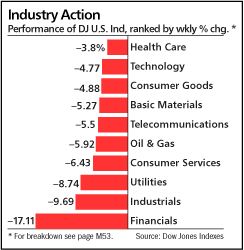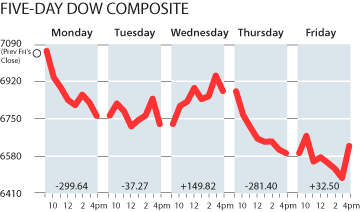From BusinessWeek
A modest, steady income from stocks such as Coca-Cola and McDonald's is enticing for those burned by growth stocks in the financial crisis.
During the long bull market, many individuals viewed dividends as a relic of their grandparents' generation—good for widows but of little value to serious investors seeking outsize returns. As growth stocks have lost their appeal amid the Wall Street meltdown, however, many investors are showing a new interest in safe stocks that pay a steady dividend. And as stock prices have tumbled, the relative yield paid out by large companies has risen: The dividend payout for companies in the Standard & Poor's 500-stock index is equal to 3.3% of the current price of these stocks—nearly twice the average payout at the end of 2007 and the highest dividend yield since 1990.
Even though President-elect Barack Obama has discussed raising the tax on dividend income for top earners, either to 20% or 25%, that won't dim their new allure. Some Wall Street pros think dividends could become a key measure by which many investors judge stocks. Investors "have a once-in-a-generation opportunity to buy quality blue-chip companies [and] lock in very satisfactory yields," says Marc Heilweil, president of Spectrum Advisory Services in Atlanta.
The good news for investors is that the relative returns from dividends haven't been this big in decades. Pros note that the average yield for the S&P 500 exceeds the current 2.2% yield on 10-year Treasuries—that hasn't happened since 1957. And money managers believe that while the payouts of banks and other troubled sectors risk being cut, many companies in the food, beverage, and health-care sectors have the cash flow to maintain their dividends. "In a lot of sectors, there is a buffer," says LPL Financial chief market strategist Jeffrey Kleintop. Some good bets include Coca-Cola (COK) and McDonald's (MCD).
What to buy? While many payouts look tempting, pouring money into stocks with suspiciously large dividends can be just as dangerous as chasing the latest Internet highflier. Indeed, some companies with hefty dividend yields backed into that position only after their stocks plunged. And the unwillingness of investors to dive back in to capture that yield suggests the smart money expects a dividend cut, or worse. "Sometimes the reason a company has a high dividend is that the fundamentals are rapidly deteriorating," says Scott Jones, a principal at Minneapolis asset manager Lowry Hill.
DANGEROUS RATIOS
That may be the case with many real estate investment trusts, or REITs, according to Paul Gray, a portfolio manager at Kensington Investment Group. REITs borrow to buy real estate, so the state of the credit markets is a key concern. "The lack of credit is going to hurt companies that have a lot of debt coming due," Gray says, citing General Growth Properties (GGP) as a REIT that was forced to suspend its dividend.
One way to determine if a company's dividend is sustainable is to calculate its "payout ratio," the percentage of net income that it pays out in dividends. If the ratio is too high—say, 70%—and earnings fall, a company has three choices: It can cut the dividend, raid its cash reserves, or dial back on crucial investments in its business.
3M (MMM), with a dividend yield of 3.6%, has no such risk. Heilweil notes that while it has cut jobs and profit expectations, its payout ratio is a mere 37%, and it is sitting on almost $3 billion in cash. The maker of all things sticky generated $3.1 billion in free cash flow in the past year. That gives it enough of a cushion to cover its $1.4 billion annual payout even if its earnings next year tumble by 3% to 12%, as 3M recently forecast.
Investors should also examine a company's cash position and its ability to generate steady profits during past downturns.
Paul Alan Davis, manager of the Schwab Dividend Equity Fund, uses proprietary financial screens to identify "big stable companies that have a lot of cash and are better able to withstand this slowdown." His holdings include Chevron and Procter & Gamble .
P&G is part of an elite group: The Standard & Poor's S&P 500 Dividend Aristocrats—52 large companies, including ExxonMobil (CVX) and Wal-Mart Stores (WMT), that have raised their dividends in each of the past 25 years, even during recessions. While there are no guarantees that every one of these outfits will maintain its streak through the current recession, many professionals believe the Aristocrats are less likely to cut their dividends in the hard times that may lie ahead. "An equity investor more than ever wants to own quality," says Don Taylor, a portfolio manager at Franklin Advisory Services. "You don't know how bad the economy is going to be, and for how long."
One Aristocrat at risk of being dethroned, however, is Gannett (GCI). The newspaper company, which saw its earnings plummet 32% last quarter and its credit rating trimmed by S&P, sports a dividend yield above 21%—a sign that the market believes Gannett's dividend is unsustainable.
Investors who want the income stream from dividends, but without doing the research, can avail themselves of the many income-oriented stock funds. One option recommended by the mutual fund watchers at Morningstar (MORN) is the Pioneer Equity Income fund, managed by John A. Carey since 1990. With a dividend yield of 3.7%, the four-star fund's current top holdings include H.J. Heinz (HNZ) and Dow Chemical (DOW)—companies that should pay dividends for years to come
Subscribe to:
Post Comments (Atom)


No comments:
Post a Comment